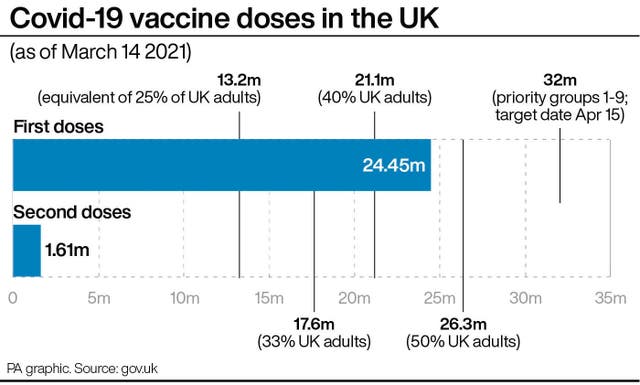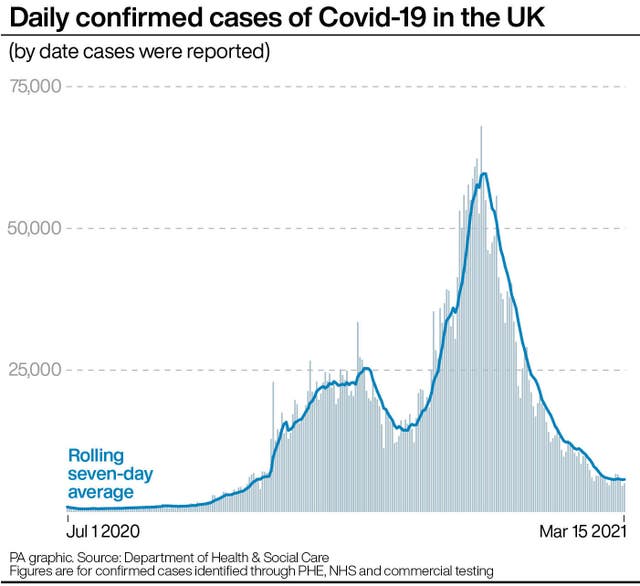Johnson and experts defend AstraZeneca vaccine as European nations pause its use
The European Medicines Agency said the benefits of the jab outweigh the potential risk of side effects.

Boris Johnson insisted the Oxford/AstraZeneca Covid-19 vaccine is safe despite more countries suspending its use.
As Germany, France and Italy paused injections of the vaccine amid concerns about blood clots in those who have had the shot, the European Union’s medical regulator insisted its benefits outweighed the risk of side effects.
The European Medicines Agency (EMA) said “many thousands of people” develop blood clots every year in the EU and “the number of thromboembolic events overall in vaccinated people seems not to be higher than that seen in the general population”.
The EMA’s safety committee is reviewing the data and working closely with the company, experts in blood disorders, and authorities including the UK’s Medicines and Healthcare products Regulatory Agency (MHRA).
The committee will further review the information on Tuesday ahead of an extraordinary meeting on Thursday to consider any further actions that may need to be taken.
“While its investigation is ongoing, EMA currently remains of the view that the benefits of the AstraZeneca vaccine in preventing Covid-19, with its associated risk of hospitalisation and death, outweigh the risks of side effects,” the regulator said.
The Prime Minister was asked directly if he could tell the public that the AstraZeneca vaccine was safe.
He said: “Yes, I can. In the MHRA we have one of the toughest and most experienced regulators in the world.
“They see no reason at all to discontinue the vaccination programme… for either of the vaccines that we’re currently using.”

The German government said it was suspending its use of the Oxford/AstraZeneca vaccine as a “precaution” and on the advice of its national vaccine regulator.
According to the European Centre for Disease Prevention and Control, Germany has received slightly more than three million doses of the AstraZeneca vaccine and only used 1.35 million doses so far.
French president Emmanuel Macron said France was also suspending use of the vaccine as a precaution and Italy’s medicines regulator announced a temporary ban.
Later on Monday Spain’s health minister announced a two-week ban on using the AstraZeneca vaccine.
The Netherlands, the Republic of Ireland, Denmark, Norway, Bulgaria, Iceland and Thailand have already temporarily suspended their use of the jab.
Last week, the World Health Organisation (WHO), the EMA and the MHRA said there was no evidence of a link between the jab and an increased risk of blood clots.
Professor Andrew Pollard, head of the Oxford University vaccine group, said while it was right that regulators investigate reports of such side effects, data from millions of people was “very reassuring” that there was no link.
He said “safety is clearly absolutely paramount” but that about 3,000 cases of blood clots occur every month in the UK from other causes.
“So, when you then put a vaccination campaign on top of that, clearly those blood clots still happen and you’ve got to then try and separate out whether, when they occur, they are at all related to the vaccine or not,” he told BBC Radio 4’s Today programme.
Prof Pollard said that more than 11 million doses have now been given in the UK, and the MHRA has said “very clearly that they’re not seeing any increase in the number of cases of blood clots” over what they would see normally.
Professor Anthony Harnden, deputy chairman of the Joint Committee on Vaccination and Immunisation (JCVI), also sought to reassure the public and said people should attend their vaccine appointments.
He told BBC Breakfast: “We will keep monitoring this and if there is any safety signals that we are concerned about, we would let the public know straight away.
“At the moment, the message is absolutely clear – go and get your vaccine when offered.
“I spent all yesterday in our practice vaccinating with the Oxford/AstraZeneca vaccine – I would not be immunising my own patients unless I felt it was safe.”
AstraZeneca also said its own review had found no evidence of an increased risk of pulmonary embolism, deep vein thrombosis (DVT) or thrombocytopenia, in any defined age group, gender, batch or in any particular country.
In clinical trials for the jab, the number of clotting incidents was small and “lower in the vaccinated group” than in those who were unvaccinated, it added.
“To overcome the pandemic, it is important that people get vaccinated when invited to do so,” the firm said in a statement.

Official data up to March 14 shows that of the 26,063,501 jabs of all types given in the UK so far, 24,453,221 were first doses – a rise of 257,010 on the previous day.
Some 1,610,280 were second doses, an increase of 25,371.
A further 64 people had died within 28 days of testing positive for Covid-19 as of Monday, bringing the UK total to 125,580.
But separate figures published by the UK’s statistics agencies for deaths where Covid-19 has been mentioned on the death certificate, together with additional data on deaths that have occurred in recent days, show there have now been 147,000 deaths involving Covid-19 in the UK.
The Government also said that, as of 9am on Monday, there had been a further 5,089 lab-confirmed cases in the UK.
As of Monday the total number of reported Covid-19 tests carried out in the UK since the start of the pandemic has passed 100 million.





